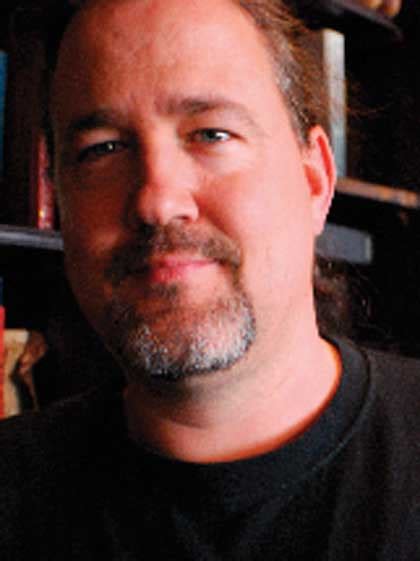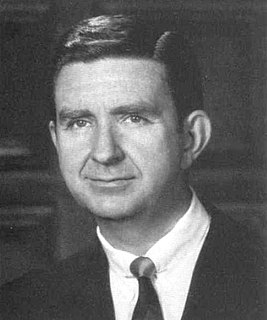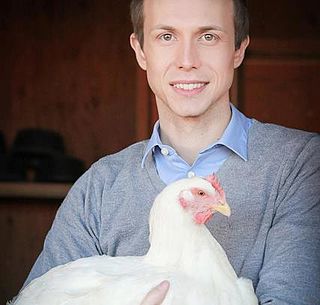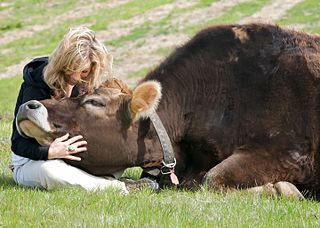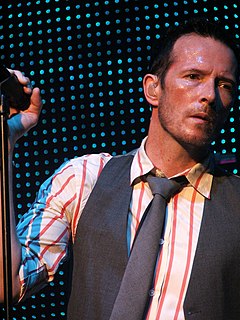Top 728 Consume Quotes & Sayings - Page 12
Explore popular Consume quotes.
Last updated on December 18, 2024.
Today, your cell phone has more computer power than all of NASA back in 1969, when it placed two astronauts on the moon. Video games, which consume enormous amounts of computer power to simulate 3-D situations, use more computer power than mainframe computers of the previous decade. The Sony PlayStation of today, which costs $300, has the power of a military supercomputer of 1997, which cost millions of dollars.
The food industry is spending almost $2 billion a year marketing directly to children and teens. We know that those ads lead to children demanding certain brands, and we know that food and drink marketing gets all of us to consume more calories. If we're going to address diet-related illnesses, talking about marketing to kids is a key step. There should be places like schools that are protected sanctuaries from commercialization and from advertising, especially when it comes to kids' health.
I am a little troubled about the tea service in the electronic computer building. Apparently the members of your staff consume several times as much supplies as the same number of people do in Fuld Hall and they have been especially unfair in the matter of sugar.... I should like to raise the question whether it would not be better for the computer people to come up to Fuld Hall at the end of the day at 5 o'clock and have their tea here under proper supervision.
Greed, envy, sloth, pride and gluttony: these are not vices anymore. No, these are marketing tools. Lust is our way of life. Envy is just a nudge towards another sale. Even in our relationships we consume each other, each of us looking for what we can get out of the other. Our appetites are often satisfied at the expense of those around us. In a dog-eat-dog world we lose part of our humanity.
A current pejorative adjective is narcissistic. Generally, a narcissist is anyone better looking than you are, but lately the adective is often applied to those "liberals" who prefer to improve the lives of others rather than exploit them. Apparently, a concern for others is self-love at its least attractive, while greed is now a sign of the hightest altruism. But then to reverse, periodically, the meanings of words is a very small price to pay for our vast freedom not only to conform but to consume.
Too much of what led up to the crisis in the old bubble days—the conspicuous consumption, the latter-day Gatsbyism—was fueled by a need to fill a huge emotional and psychological void left by the absence of meaningful work. When people cease to find meaning in work, when work is boring, alienating, and dehumanizing, the only option becomes the urge to consume—to buy happiness off the shelf, a phenomenon we now know cannot suffice in the long term.
Most people consume information passively-whatever they're being fed. They're being fed Russian television, which tells them that in the 90s there was a terrible catastrophe, that before that life had been all right, and then when Putin came many people say, "I've never lived as well as I'm living under Putin." That's true-there has never been such a level of affluence. But now, it looks like people will have to tighten their belts, and some are already having doubts.
I read," I say. "I study and read. I bet I've read everything you read. Don't think I haven't. I consume libraries. I wear out spines and ROM-drives. I do things like get in a taxi and say, "The library, and step on it." My instincts concerning syntax and mechanics are better than your own, I can tell, with all due respect. But it transcends the mechanics. I'm not a machine. I feel and believe. I have opinions. Some of them are interesting. I could, if you'd let me, talk and talk.
Among civilized and thriving nations, on the contrary, though a great number of people do no labor at all, many of whom consume the produce of ten times, frequently of a hundred times more labour than the greater part of those who work; yet the produce of the whole labour of the society is so great, that all are often abundantly supplied, and a workman, even of the lowest and poorest order, if he is frugal and industrious, may enjoy a greater share of the necessaries and conveniencies of life than it is possible for any savage to acquire.
Nevertheless, if we contemplate a society with a somewhat stable wage-unit, with national characteristics which determine the propensity to consume and the preference for liquidity, and with a monetary system which rigidly links the quantity of money to the stock of the precious metals, it will be essential for the maintenance of prosperity that the authorities should pay close attention to the state of the balance of trade. For a favourable balance, provided it is not too large, will prove extremely stimulating; whilst an unfavourable balance may soon produce a state of persistent depression.
I've been thinking a lot about why it was so important to me to do The Idiot as a novel, and not a memoir. One reason is the great love of novels that I keep droning on about. I've always loved reading novels. I've wanted to write novels since I was little. I started my first novel when I was seven.I don't have the same connection to memoir or nonfiction or essays. Writing nonfiction makes me feel a little bit as if I'm producing a product I don't consume - it's a really alienating feeling.
A lot of the content that goes directly to the internet, or is web-created content, is very hand-held video where you can watch this woman fall off the coffee table, or see a funny little gag, or is interview-style stuff, which is great. I love that. I consume it like crazy. But, this is designed to be reminiscent of what you would see during primetime, and reminiscent of what you would see in a movie theater, on any given weekend, and in that regard, it's brand new.
your name your name, paragal, in the old toung, means 'one of pure light' and so you once were. but know this: when your stroke gfalls, so shall your own star fall. Your light will go out, and you will earn a newname. You shall be caled paragor - 'one of true darkness.' darkness will be your dwelling place and it will consume you. You willl ever be hungry for what you can naver have, No darkness in alleble will be as you
Material objectives consume too much of our attention. The struggle for what we need or for more than we need exhausts our time and energy. We pursue pleasure or entertainment, or become very involved in associations or civic matters. Of course, people need recreation, need to be achieving, need to contribute, but if these come at the cost of friendship with Christ, the price is much too high. The substitutions we fashion to take the place of God in our lives truly hold no water. To the measure we thus refuse the "living water," we miss the joy we could have.
When I was a kid my primary goal in life was to find a book that was alive. Not alive in the human sense, but like a thing that would send me to a place not otherwise accessible on Earth. This book should have hidden words encrypted beneath the printed ones, so that if I worked hard enough and discovered the code I would somehow end up inside the book, or the book would take on a body and consume me, revealing a secret set of rooms behind the wall in my bedroom, for instance, inside which anything could be.
If you're writing in the mainstream... Whatever that is - the norm. The norm is likely going to be funded because you're giving people what they're used to and what they're gonna get. But anything outside of that norm is going to struggle to get funded. The people who are not "the norms" deserve the chance to make art. I think it's great for all of us to consume all these voices, and that happens when you support these voices that need to be supported because they're not the automatic choice coming out of the gate.
This new economy that's just emerged has a new central economic actor. It's not the worker, the person who produces, nor the person who consumes, the purchaser. It's a new actor that does both things at the same time, call them a creator. They both create and consume in the same single act, and we're just beginning to see the shape of this new economy and it changes not just the economy itself, it's going to change the whole nature of the work relationship.
The ever-mounting glut of waste materials is characteristic by-product of modern consumer society. It might even be argued that capitalism's continual need to find of generate markets means that disposibility and waste have become the spine of the system. To consume means, literally, to destroy or expend, and in the garbage crisis we confront the underlying truth of a society in which enormous productive capacities and market forces have harnessed human needs and desires, without regard to the long or even short-term future of life on the planet.
The iPod is clearly a tipping point (and I'm not quite sure it is a wholly positive development), because it is a revolution in the way that we consume creative property, which I would call art. It has radically changed the relationship between the artist and the audience, how money changes hands, and how much money changes hands. Music was the first, and books are coming next. The Kindle or some form of electronic book is clearly inevitable, and it will massively reshape how books are sold, who pays for them, and how they're consumed. It is going to be really fascinating.
We all have some flaws. But when I have a moment of doubt, I find inspiration from being in the moment, by letting go. I don't hold onto what I can't control. Doubt is a fleeting emotion that can destroy you if you allow it to consume your mind and spirit. Each person's time comes at variant phases, and the best you can do is enjoy what you're doing and work hard. It can't always be about you. Life is transformation - the wind blows, climate changes, birds chirp and trees burn. Where you are today is not where you will be tomorrow. The only person you can be is you.
We have brands spending ungodly amounts of money on print, television, outdoor radio, programmatic banner ads, website takeovers. Garbage. When I say garbage, they work-ish. They're just so overpriced. I don't know what else to say. I do not believe that it is worth the hundreds of thousands of dollars in distribution and hundreds of thousands of dollars in cost to make one 30-second video to tell a 29-year-old woman that your soap is great, in a world where she is not going to consume that commercial.
If the land was divided among all the inhabitants of a country, so that each of them possessed precisely the quantity necessary for his support, and nothing more; it is evident that all of them being equal, no one would work for another. Neither would any of them possess wherewith to pay another for his labour, for each person having only such a quantity of land as was necessary to produce a subsistence, would consume all he should gather, and would not have any thing to give in exchange for the labour of others.
The commerce of a free people is many times more valuable than that of slaves. Freemen produce and consume vastly more than slaves. They have therefore more to buy and more to sell. Hence the free states have a direct pecuniary interest in the civil freedom of all the other states. Commerce between free and slave states is not reciprocal or equal.
To the extent that we consume, in our present circumstances, we are guilty. To the extent that we guilty consumers are conservationists, we are absurd. But what can we do? Must we go on writing letters to politicians and donating to conservation organizations until the majority of our fellow citizens agree with us? Or can we do something directly to solve our share of the problem? I am a conservationist. I believe wholeheartedly in putting pressure on the politicians and in maintaining the conservation organizations.
Stay positive, joyful, and optimistic in your activism, even in the face of adversity. Understand that most people continue to consume animal products because they are unaware of the hidden cost - animal cruelty - not because they are bad or apathetic. Offer information, support, and resources in a friendly and supportive manner, as few people have begun their journey toward a compassionate lifestyle by being shamed or ridiculed. Turn anger and frustration into motivation to be as effective as possible.
Ne reprenez, dame, si j'ai aime , Si j'ai senti mille torches ardentes, Mille travaux, mille douleurs mordantes, Si, en pleurant, j'ai mon temps consume . Do not blame me, madam, if I loved, If I felt one thousand burning torches, One thousand labours, or one thousand scathing pains, If, in crying, I spent all my time.
The ideal human diet looks like this: Consume plant-based foods in forms as close to their natural state as possible (“whole” foods). Eat a variety of vegetables, fruits, raw nuts and seeds, beans and legumes, and whole grains. Avoid heavily processed foods and animal products. Stay away from added salt, oil, and sugar. Aim to get 80 percent of your calories from carbohydrates, 10 percent from fat, and 10 percent from protein.
MOST of the ugliness in the human narrative comes from a distorted quest to possess beauty. COVETING begins with appreciating blessings: MURDER begins with a hunger for justice. LUST begins with a recognition of beauty. GLUTTONY begins when our enjoyment of the delectable gifts of GOD starts to consume us. IDOLATRY begins when our seeing a reflection of God in something beautiful leads to our thinking that the beautiful image bearer is worthy of WORSHIP.
The phytochemicals, antioxidants, and fiber- all of the healthful components of plant foods- originate in plants, not animals. If they are present, it is because the animal ate plants. And why should we go through an animal to get the benefits of the plants themselves? To consume unnecessary, unseemly, and unhealthy substances, such as saturated fat, animal protein, lactose, and dietary cholesterol, is to negate the benefits of the fiber, phytonutrients, vitamins, minerals, and antioxidants that are prevalent and inherent in plants.
"Jace?" She offered him the glass. "I am a man," he told her. "And men do not consume pink beverages. Get thee gone, woman and bring me something brown." "Brown?" Isabelle made a face. "Brown is a manly colour," said Jace and yanked on a stray lock of Isabelle's hair with his free hand. "In fact, look - Alec is wearing it." Alec looked mournfully down at his sweater. "It was black," he said. "But then it faded." "You could dress it up with a sequined headband," Magnus suggested.
She cried out into his kiss, her hands clawing his shoulders, adrift now in a pleasure that threatened to consume her. In her sexual lifetime she had never known anything like it. Had never tasted such a dark kiss, one that warned her he had no intention of making allowances for sensual inexperience. He was hungry. Needy. And she was the meal he craved.
The median family income in the U.S. is lower than it was a quarter-century ago, and if people don't have income, they can't consume, and you can't have a strong economy. There's significant risk - actually it's no longer a risk - a significant likelihood of a marked slowdown not only in China, but also in a lot of other countries like Brazil, which is in recession. All of the other countries that depend on commodities, including Canada, are facing difficulties. So it's hard to see a story of a strong U.S. economy.
I have no problem with a war for oil-if we accompany it with a real program for energy conservation. But when we tell the world we couldn't care less about climate change, that we feel entitled to drive whatever big cars we feel like, that we feel entitled to consume however much oil we like, the message we send is that a war for oil in the gulf is not a war to protect the world's right to economic survival-but our right to indulge. Now that will be seen as immoral.
Most of us have become Ecozombies, desensitized, environmental deadheads. On average, society conditions us to spend over 95% of our time and 99.9% of our thinking disconnected from nature. Nature's extreme absence in our lives leaves us abandoned and wanting. We feel we never have enough. We greedily, destructively, consume and, can't stop. Nature's loss in our psyche produces a hurt, hungering, void within us that bullies us into our dilemmas.
The great challenge facing us today is to learn once again how to talk to one another, not simply how to generate and consume information. The latter is a tendency which our important and influential modern communications media can encourage. Information is important, but it is not enough. All too often things get simplified, different positions and viewpoints are pitted against one another, and people are invited to take sides, rather than to see things as a whole.
Purchasing power is a license to purchase power. The old proletariat sold its labour power in order to subsist; what little leisure time it had was passed pleasantly enough in conversations, arguments, drinking, making love, wandering, celebrating and rioting. The new proletarian sells his labour power in order to consume. When he’s not flogging himself to death to get promoted in the labour hierarchy, he’s being persuaded to buy himself objects to distinguish himself in the social hierarchy. The ideology of consumption becomes the consumption of ideology.
Money is not a part of the visible sector of the economy; people do not consume money. Money is not a physical factor of production, but rather a yardstick for measuring economic input, economic outtake and the relative values of the real goods and services of the economic world. Money provides a method of measuring obligations, rights, powers and privileges. It provides a means whereby certain individuals can accumulate claims against others, or against the economy as a whole, or against many economies.
Requiring the payment of higher wages will lead to a loss of some jobs and a raising of prices which drives companies to search for automation to reduce costs. On the other hand, those receiving higher wages will spend more (the marginal propensity to consume is close to 1 for low income earners) and this will increase demand for additional goods and services. Henry Ford had the clearest vision of why companies can actually benefit by paying higher wages.
One day I'll give birth to a tiny baby girl and when she's born she'll scream and I'll tell her to never stop I will kiss her before I lay her down at night and will tell her a story so she knows how it is and how it must be for her to survive I'll tell her to set things on fire and keep them burning I'll teach her that fire will not consume her that she must use it
Modern capitalism needs men who cooperate smoothly and in large numbers; who want to consume more and more; and whose tastes are standardized and can be easily influenced and anticipated. It needs men who feel free and independent, not subject to any authority or principle or conscience-- yet willing to be commanded, to do what is expected of them, to fit into the social machine without friction; who can be guided without force, led without leaders, prompted without aim-- except the one to make good, to be on the move, to function, to go ahead.
Somebody's buying these treasury bills at 1/20th of one percent. I mean we consuming about $2 billion a day of goods and services beyond what we're producing.As long as we consume more than we produce, and we trade away little pieces of the country daily, they're going to own something. Now, they can't run from American assets. I mean every day the rest of the world is going to have about two billion more of American assets than we have, as long as they sell us these goods.
You must all know half a dozen people at least who are no use in this world, who are more trouble than they are worth. Just put them there and say Sir, or Madam, now will you be kind enough to justify your existence? If you can't justify your existence, if you're not pulling your weight in the social boat, if you're not producing as much as you consume or perhaps a little more, then, clearly, we cannot use the organizations of our society for the purpose of keeping you alive, because your life does not benefit us and it can't be of very much use to yourself.
But carbon 13 [the carbon from corn] doesn't lie, and researchers who have compared the isotopes in the flesh or hair of Americans to those in the same tissues of Mexicans report that it is now we in the North who are the true people of corn.... Compared to us, Mexicans today consume a far more varied carbon diet: the animals they eat still eat grass (until recently, Mexicans regarded feeding corn to livestock as a sacrilege); much of their protein comes from legumes; and they still sweeten their beverages with cane sugar. So that's us: processed corn, walking.
The UK still has time to accelerate the take-up of renewable energy and put the nation on a path towards clean energy that is cheaper, stable and more sustainable. We have a stark choice: We can stay stuck in the last century's boom and bust approach to our economy in the way we consume energy and resources, or create a sustainable, stable and renewable energy infrastructure with the long term environmental and employment benefits that ensue
I was in a pharmacy and I saw the warnings on the backs of poisonous substances, and I thought, "Well, that's what I can do." So I wrote a list of ingredients in the book, and warnings that they shouldn't consume those ingredients. The editor and the publisher thought that it was a great way to go in terms of reverse psychology, but it honestly hadn't occurred to me that it was reverse psychology. I just thought that it was sort of an honest assessment making clear that if you were timid or easily disturbed, you could turn away.
For too long we have tried to consume our
way to prosperity. Look at the cost: polluted
lands and oceans, climate change, growing
scarcity of resources from food to land to fresh
water, rampant inequality. We need to invent a
new model; a model that offers growth and social inclusion... that is more respectful of the
planet's finite resources. Nature has been kind
to human beings, but we have not been kind to
nature.
One day, through my prayers, an overwhelming amount of love started flowing into me, filling up the dark hole that threatened to consume me. I suddenly realized that what I was feeling was the love of the Earth, the love of Creation. Every day we, as a species, do so much to destroy Creation's ability to give us life. But that Creation continues to do everything in its power to give us life anyway. And that's true love.
The Church is likewise conscious of the responsibility which all of us have for our world, for the whole of creation, which we must love and protect. There is much that we can do to benefit the poor, the needy and those who suffer, and to favour justice, promote reconciliation and build peace. But before all else we need to keep alive in our world the thirst for the absolute, and to counter the dominance of a one-dimensional vision of the human person, a vision which reduces human beings to what they produce and to what they consume: this is one of the most insidious temptations of our time.
The psychology of the saver and the psychology of the investor is very closely connected with Keynes' distinction between risk and uncertainty. When the future is uncertain, he thought that a lot of saving would be directed towards securing, securing more, getting more security in the present, rather than building wealth in the future, which was the classical view, you save in order to invest, in order to consume more later on. What he had called the propensity to hoard or liquidity preference would normally be stronger than the inducement to invest.
I see love, like art, as an obsession. Maybe that's an overly romantic view of human existence, but I'm an overly romantic human being. If love, like rock and roll, doesn't consume me 24-7, it's not love. It can be respect, appreciation, admiration, wonderment, it can be a world of glory and a lifetime of peace, but I can't call it love. Love burns me and confuses me. Love's a light that can't be extinguished.
Now although man is created for the possession of happiness, yet, having deviated from his true end, his nature has become deformed and is entirely repugnant to true beatitude. And on this account we are forced to submit to God this depraved nature of ours which fills our understanding with so many occupations, and causes us to deviate from the true path, in order that he may entirely consume it until nothing remains there but himself; otherwise the soul could never attain stability nor repose, for she was created for no other end.
Back in middle school, Catherine and I had gone through this stage where all we would read were fantasy books. We'd consume them like M&M's, by the fistful, J.R.R. Tolkien and Terry Brooks and Susan Cooper and Lloyd Alexander. Susan Boone looked, to me, like the queen of the elves (there's almost always an elf queen in fantasy books). I mean, she was shorter than me and had on a strange lineny outfit in pale blues and greens.
The richer people, when they get another $100,000, or another million, or 10 million, don't tend to spend it as much as the poorer people would if they got another $100 or $1,000 or $5,000. All the empirical evidence suggests that the rich tend to consume a lower proportion of income than middle and lower-income people.
We continually make decisions in private which affect the commonweal, as the ecologists (to take but one example) have shown us. When I keep my house warmer than it needs to be, I consume fuel which might help someone else keep warm, or keep a job. When the food I eat is high on the protein chain I contribute to a maldistribution of protein around the world. When I teach my children to be primarily concerned with private gain, I diminish the ranks of public leadership in the rising generation.
Planning complex, beautiful meals and investing one's heart and time in their preparation is the opposite of self-indulgence. Kitchen-based family gatherings are process-oriented, cooperative, and in the best of worlds, nourishing and soulful. A lot of calories get used up before anyone sits down to consume. But more importantly, a lot of talk happens first, news exchanged, secrets revealed across generations, paths cleared with a touch on the arm. I have given and received some of my life's most important hugs with those big oven-mitt potholders on both hands.
Pain is part of how I get inspiration and part of how I gain wisdom on life. I guess the point I'm trying to make is that I don't transform it, I just let it be. I kind of let it move through me, let it consume me and I let it take me over and hurt me, and I let it go away when it's ready to go away and I understand that it's just part of the process.
That is the magic of travel. You leave your home secure in your own knowledge and identity. But as you travel, the world in all it's richness intervenes. You meet people you could not invent; you see scenes you could not imagine. Your own world, which was so large as to consume your whole life, becomes smaller and smaller until it is only one tiny dot in time and space. You return a different person.
I do not love you except because I love you; I go from loving to not loving you, From waiting to not waiting for you My heart moves from cold to fire. I love you only because it's you the one I love; I hate you deeply, and hating you Bend to you, and the measure of my changing love for you Is that I do not see you but love you blindly. Maybe January light will consume My heart with its cruel Ray, stealing my key to true calm. In this part of the story I am the one who Dies, the only one, and I will die of love because I love you, Because I love you, Love, in fire and blood.
As businessmen caught a glimpse of the potentialities inherent in endlessly expanding the wants of people under consumerism, forced draft or otherwise, many began to see blue skies... What was needed was strategies that would make Americans in large numbers into voracious, wasteful, compulsive consumers-and strategies that would provide products assuring such wastefulness. Even where wastefulness was not involved, additional strategies were needed that would induce the public to consume at ever-higher levels.
For example, the supporters of tariffs treat it as self-evident that the creation of jobs is a desirable end, in and of itself, regardless of what the persons employed do. That is clearly wrong. If all we want are jobs, we can create any number--for example, have people dig holes and then fill them up again, or perform other useless tasks. Work is sometimes its own reward. Mostly, however, it is the price we pay to get the things we want. Our real objective is not just jobs but productive jobs--jobs that will mean more goods and services to consume.












